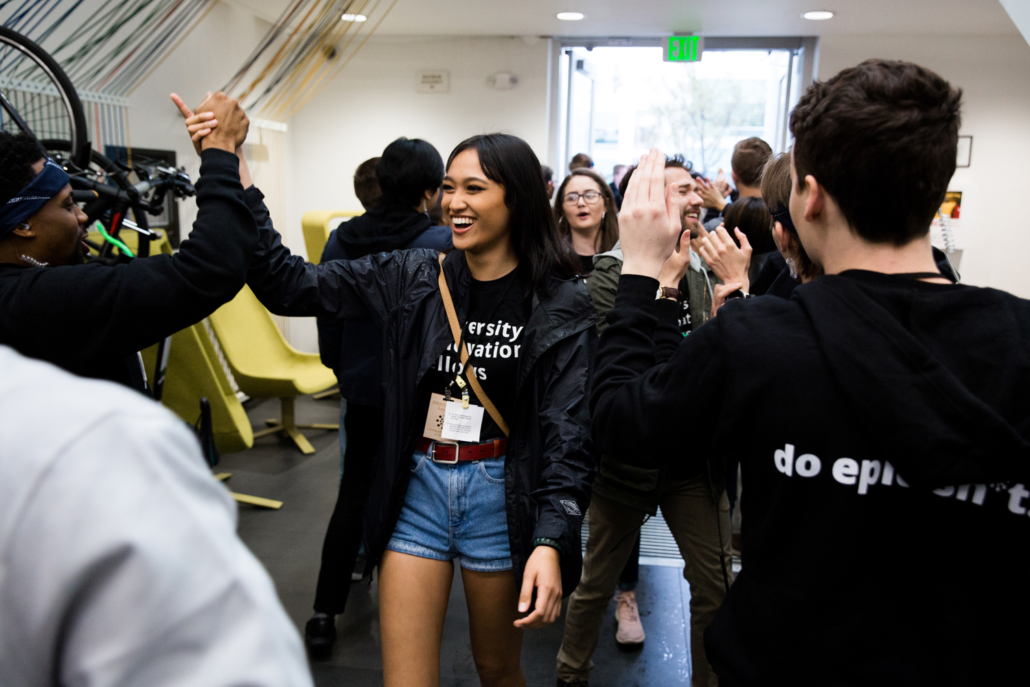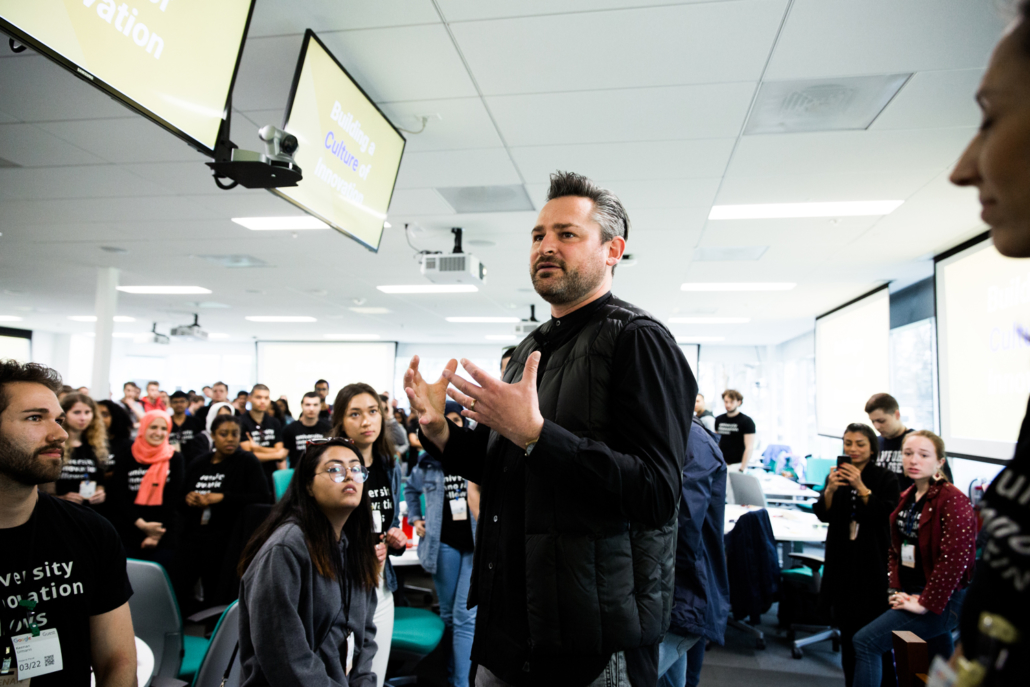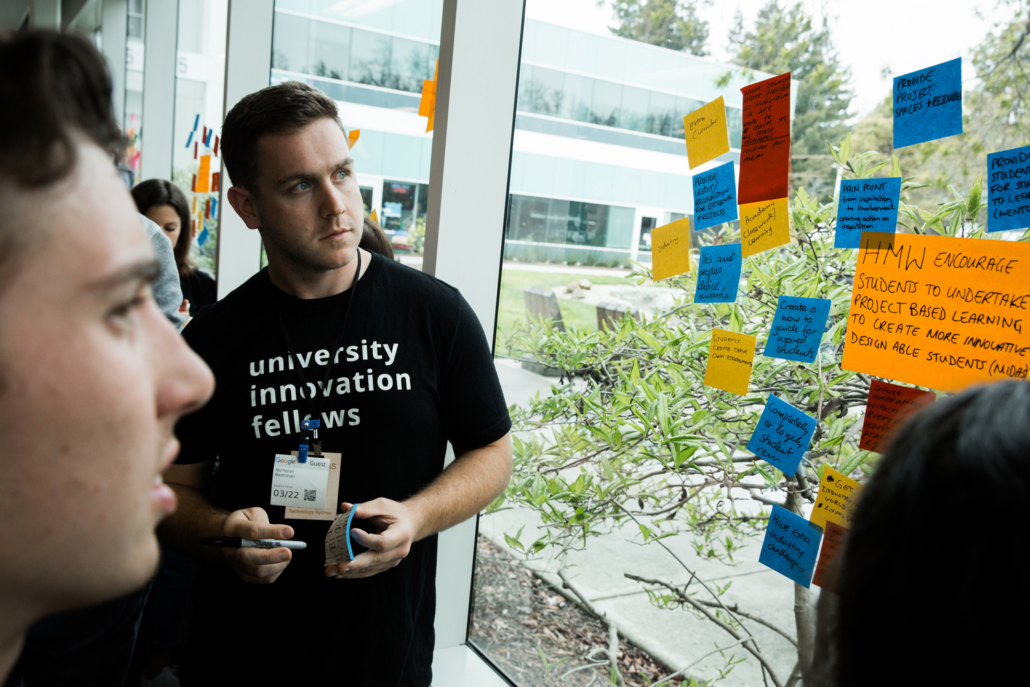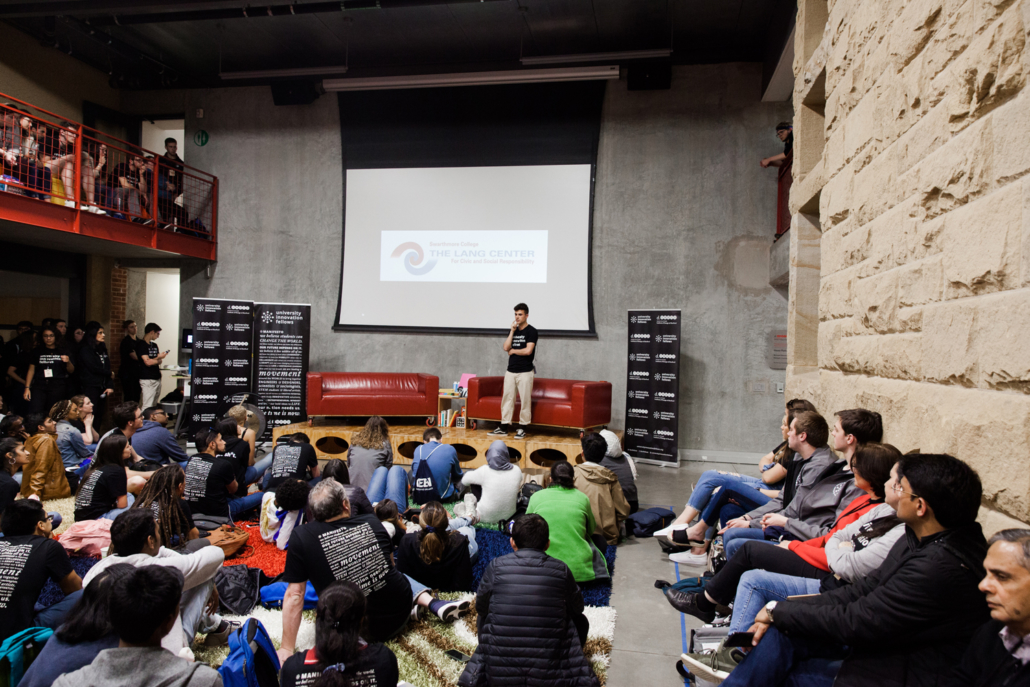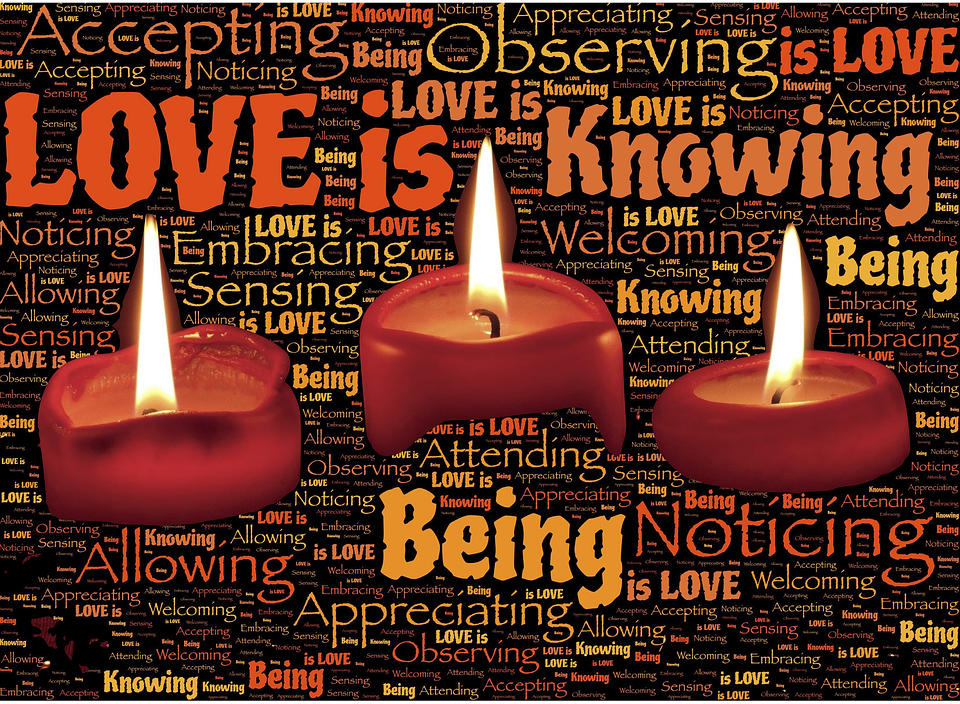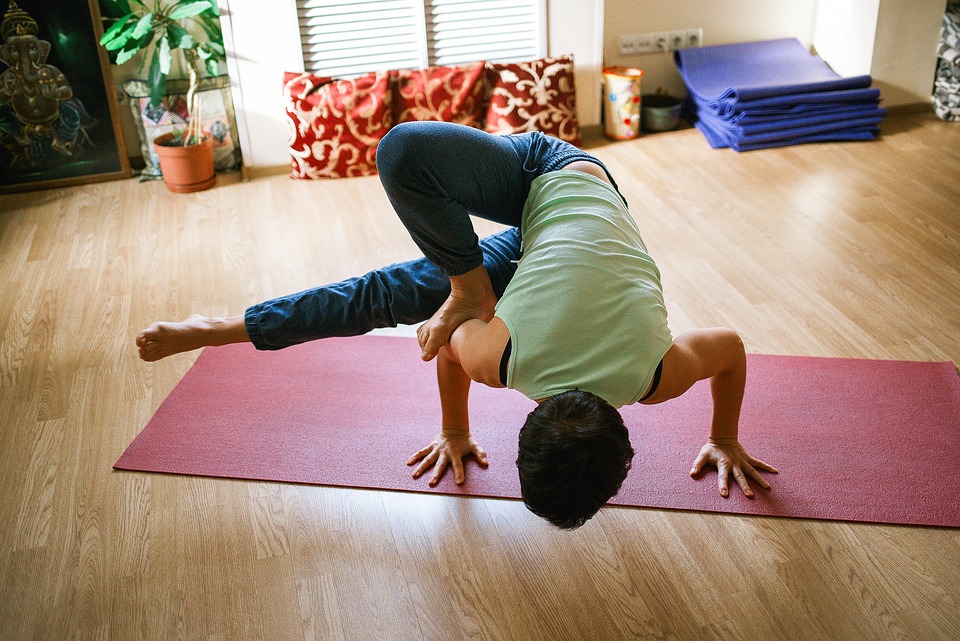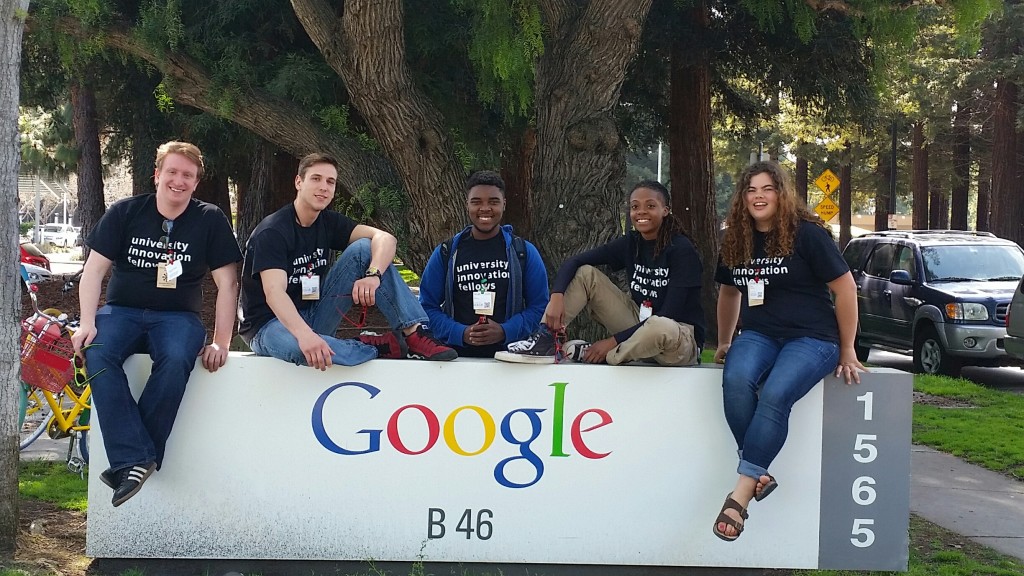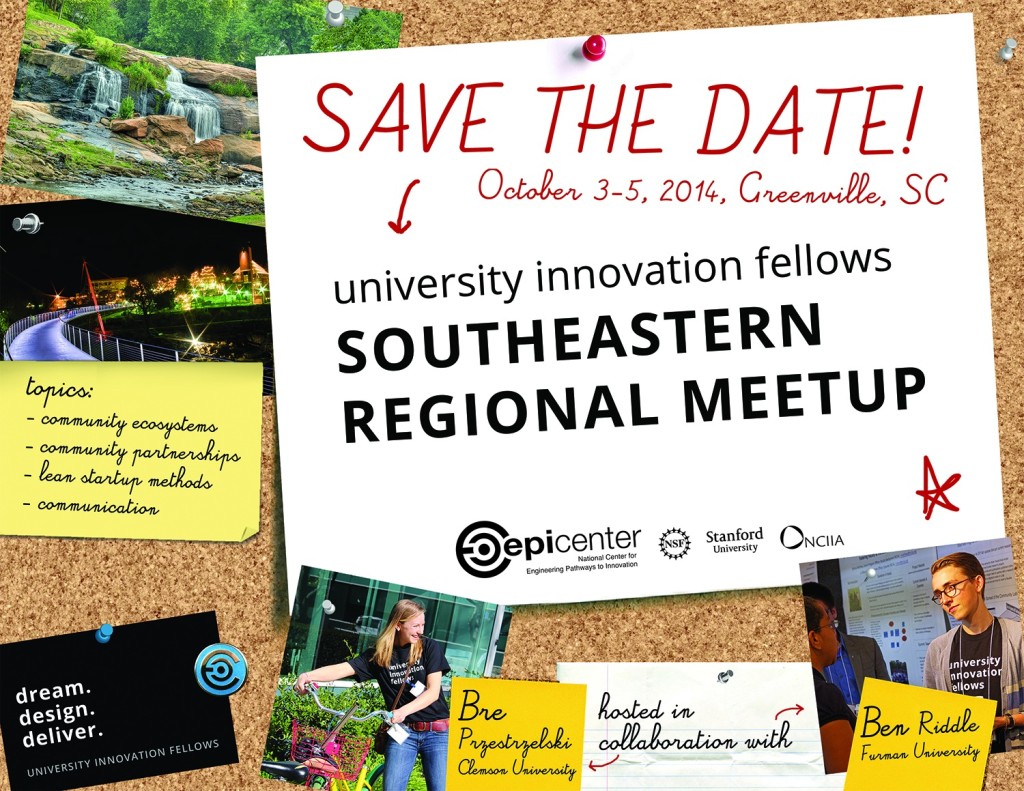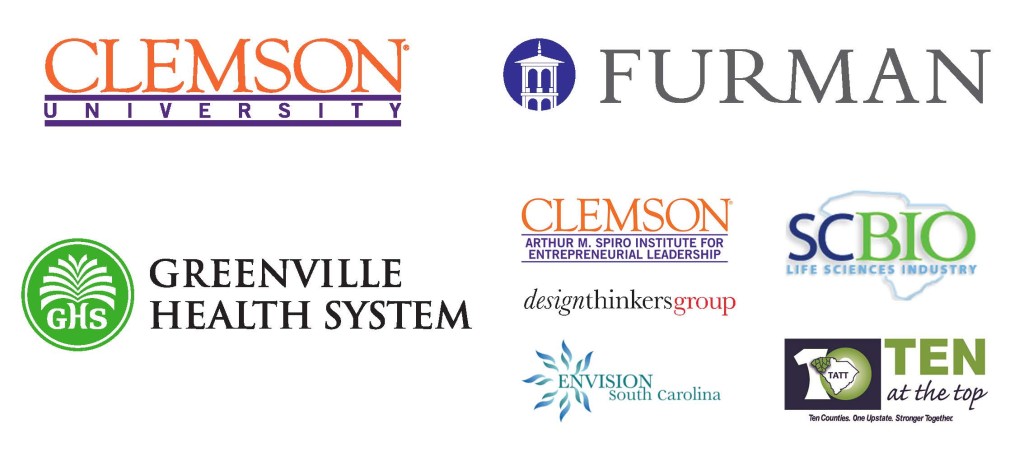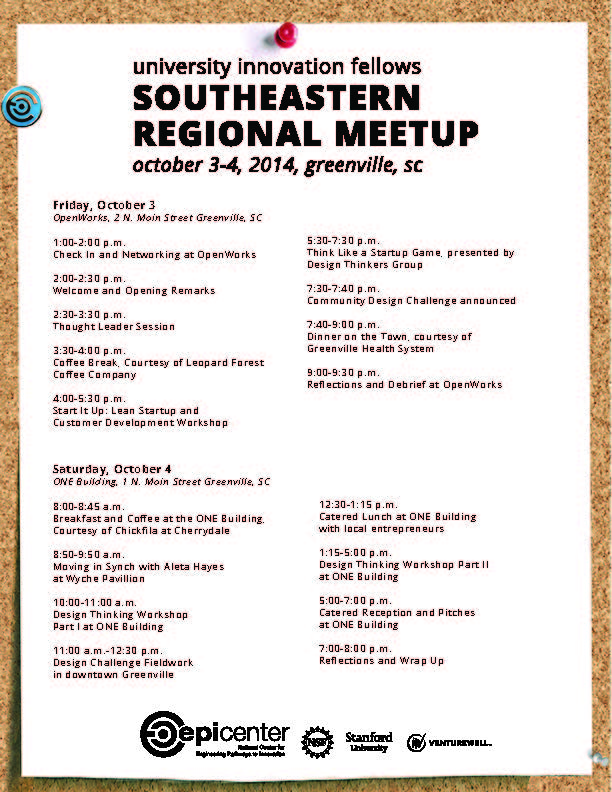A Virtual Community of Changemakers is Born
by Laurie Moore
Originally posted on Medium
This spring, the coronavirus pandemic forced our University Innovation Fellows team to translate an in-person learning experience to an online environment. We weren’t the only ones. Since April 2020, many students around the world have been cooped up at home, and educators have been forced to adapt their teaching to reach students through their computer and phone screens.
We need to reimagine what learning may look like when many of the elements of education we have taken for granted have been rendered useless by the pandemic. Now, more than ever, we need student change agents like the University Innovation Fellows to help higher education evolve to meet this challenge.
Our global community is self-organizing in different ways to address new challenges related to the pandemic. Our team responded to this interest and motivation by holding our program’s first-ever online meetup on March 20. And, true to our commitment to experiential learning, this was no “talking head” lecture. Like many other teachers around the world, we had to get creative and imagine what a community gathering could look like in lieu of physical proximity.
The good news is that our Fellows are used to experiments. We often try out new tools, methods and activities with them, and we let them know that we’re prototyping something new with the hope that they feel comfortable pushing their boundaries as well.
Here’s what we experimented with, how it went, and lessons we learned.
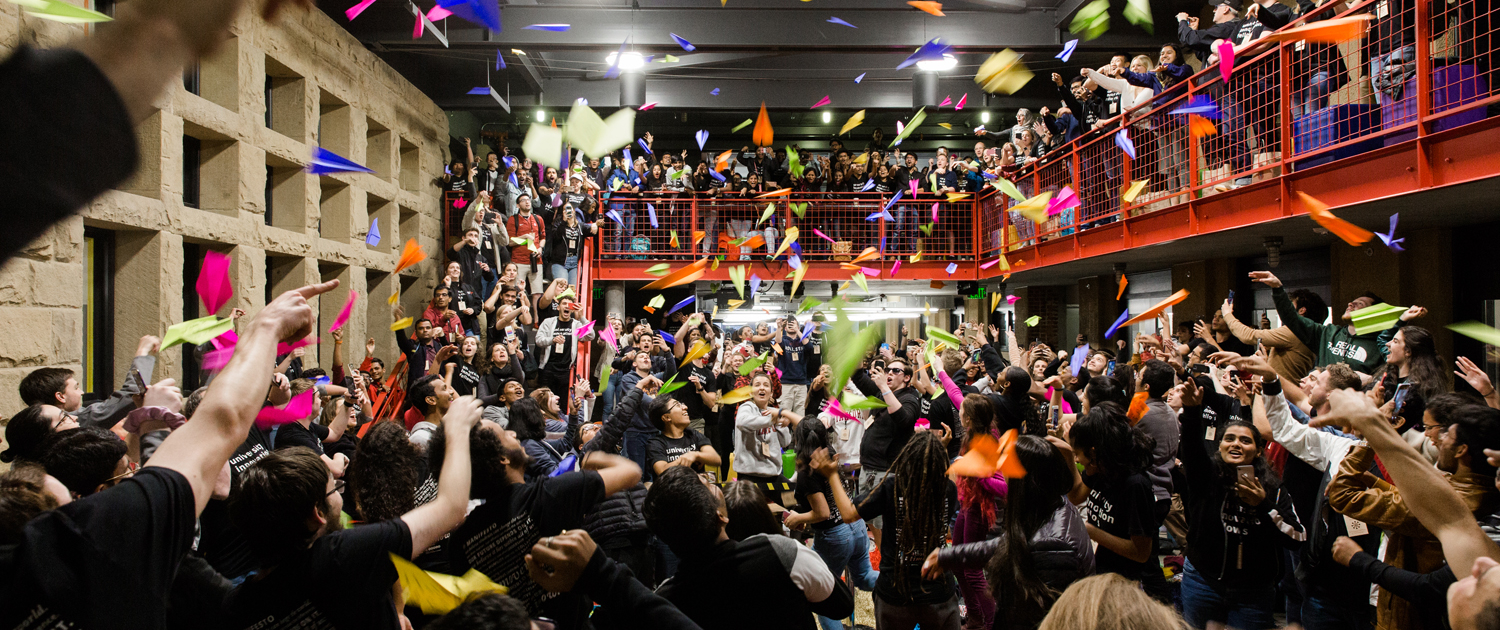
Organizing a massive global event…online and in 3 weeks
At the end of February, the pandemic forced us to make a difficult decision — to postpone (and eventually cancel) our annual Silicon Valley Meetup, held at the end of March every year at the d.school and at locations around the Bay Area. This event gathers 350+ Fellows who trained that year, along with their faculty champions, for five days of in-person activities.
This huge gap in our Fellows’ learning journey was an opportunity for us to try something new. So without any hesitation, we invited our whole community of 3,000+ Fellows and faculty to an online meetup on Zoom. Then we set out to plan the event.
We aimed to keep the same design principles and goals that guide our in-person event: experiential activities, building connections among Fellows, giving learners autonomy, and creating a sense of community.
In addition, with so many new challenges suddenly facing people worldwide due to the pandemic, we saw this as an opportunity to leverage Fellows’ ingenuity and harness their sense of purpose and urgency about helping to alleviate this crisis.
One challenge we faced when planning the online event was figuring out how to move people from large groups to small groups with ease and with minimal effort for our participants. At our in-person Meetup, we plan many simultaneous sessions led by different facilitators. Participants also collaborate in small teams and join sessions according to their interests. Recreating these elements in an online event was no easy feat. But, we came pretty close. The team organized a collection of Zoom rooms, staging documents for the facilitators, and many shared editable cloud-based tools that participants used to co-create the learning outcomes. For this online meetup, we experimented with the use of a tool that was new to us called Mural. We also created a series of Google docs as backup in case technology failed us. More on this below.

And we are live!
The two-hour event, which we called “UIF Online Meetup: Spreading Creativity,” started with a short global introduction and warm-up activities for the almost 200 participants. Using Poll Everywhere, participants shared where they were from around the world and how they were feeling (we hoped this would help them realize they are not alone in their feelings). We also did an activity (point to the future) to remind them to keep empathy at the core of what they do.
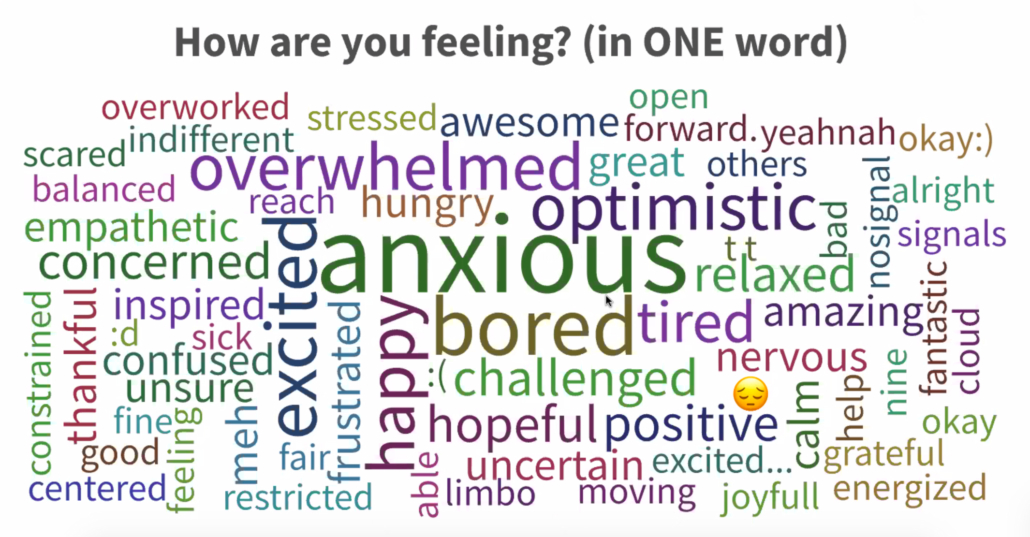
The core of the meetup consisted of two rounds of activities: we started with brainstorms on five design challenges (held in different Zoom rooms — and not breakout rooms — so that attendees could virtually walk to the challenge of their choice).
Five design challenges:
- How might we foster community among students in an online environment?
- How might we create new practices and rituals that support social distancing, while fostering community connectedness and preventing isolation?
- How might we help faculty who are redesigning their classes for online/distributed teaching?
- How might we use this moment to reimagine the 4-year college experience?
- How might we support the most vulnerable students during this crisis?
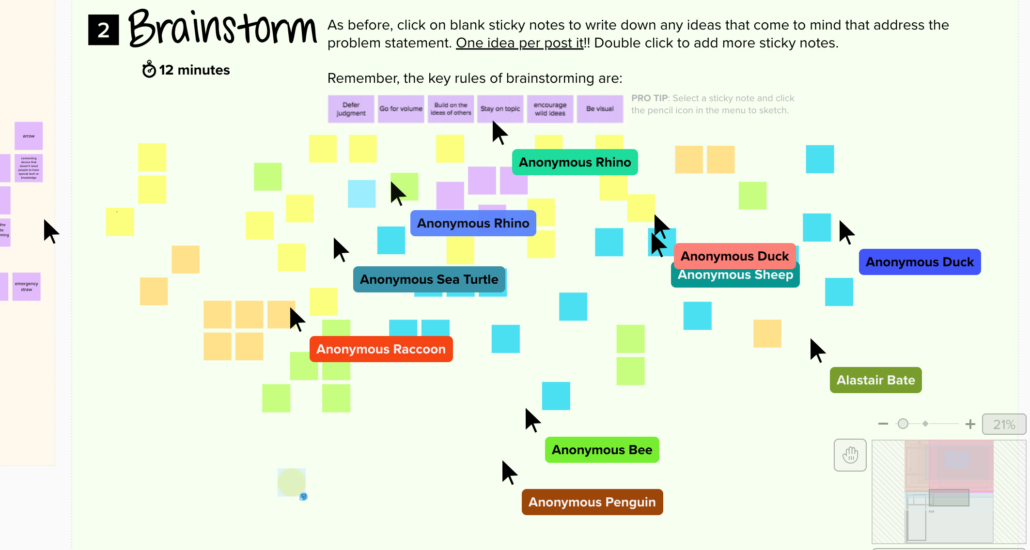
After a short global debrief of the challenges, we then offered a second series of sessions, in which participants could choose to go back to one of the original five challenges to flesh out some of the ideas in small teams, or they could opt for one of three workshops.
Three additional breakout sessions:
- “Boost your Negotiation Superpowers” with David Johnson (Law School, also teaching at d.school)
- “The Reciprocity Ring” with Meenu Singh (Masters student at Stanford Graduate School of Education, also teaching at d.school)
- “The Human Kaleidoscope” with Denise Crossan (Swarthmore College, one of the Faculty Champions in our community)
For the brainstorms, we used a new (to us) tool called Mural, so we had to learn it in just a few days. The participants discovered how to navigate the tool during the event, so this was another layer of learning for everyone. We set their expectations at the beginning by stating that we were all navigating new ways of teaching and learning online, so it is important to be patient and resilient in the face of technical glitches (there were some).
Additionally, in order to provide new Fellows with relatable role models, our breakout sessions were facilitated by several experienced Fellows who had been also selected to help us with the in-person, postponed event.
After engaging the Fellows with a final reflection prompt via Poll Everywhere (“I used to think… Now I think…”), we wrapped up with an impromptu dance party, on the suggestion of one of the participants, to the tune of ABBA’s “Dancing Queen” (song choice also by a participant).
As is typical with online video conference tools, some of the participants kept their cameras off due to connection issues or privacy, but the majority of our attendees kept their cameras on which is how we like it. We saw lots of engagement, smiles, dancing, and note-taking.
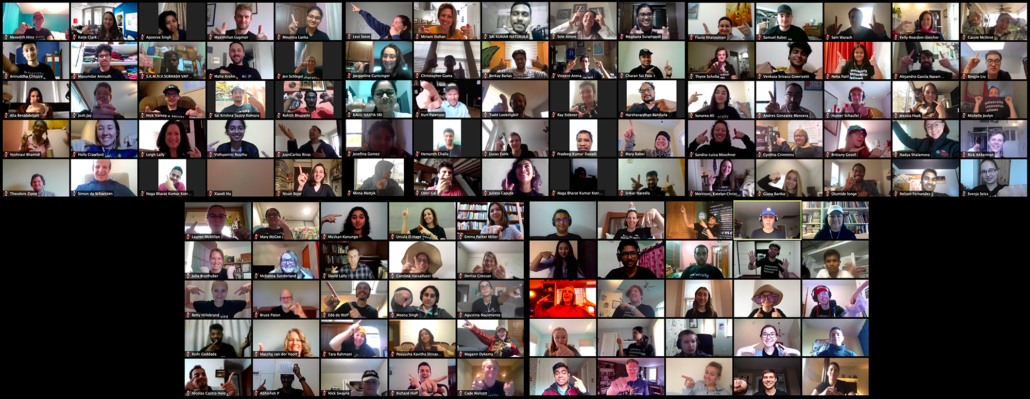
How did it go?
Here’s a selection of learnings our participants shared:
“I used to think online education transition would be a detriment to my education. Now I think this is a beautiful opportunity to bring even more people together.”
“I used to think that self quarantining meant that I was alone. Now I think that there are many ways to interact with others even while I’m at home.”
“I used to think our UIF work was on pause during this time, now I think we’re needed more than ever!”
One aspect that we’ll keep in mind for next time is that when people (and this many!) are getting used to new tools and modes of interactions, everything takes longer. We will definitely insert some breaks, as 2 hours of fully experiential activities feels even more exhausting in a virtual space where everyone can contribute at the same time via the chat.
Also, while it was nice to memorialize the event with a group “selfie” (it took 5 screenshots to get everyone) a few of the participants did not have access to video, so they may have felt left out. One idea for next time is to take a second selfie in which everyone turns off their cameras so that only their names are visible and we are all the same. Or to ask those students to send us any photo via email and photoshop them in.
Several Fellows and faculty commented they not only learned something new, but felt “good energy gush through my veins” and “a much-needed getaway from the ongoing crisis.” Our team felt the same!
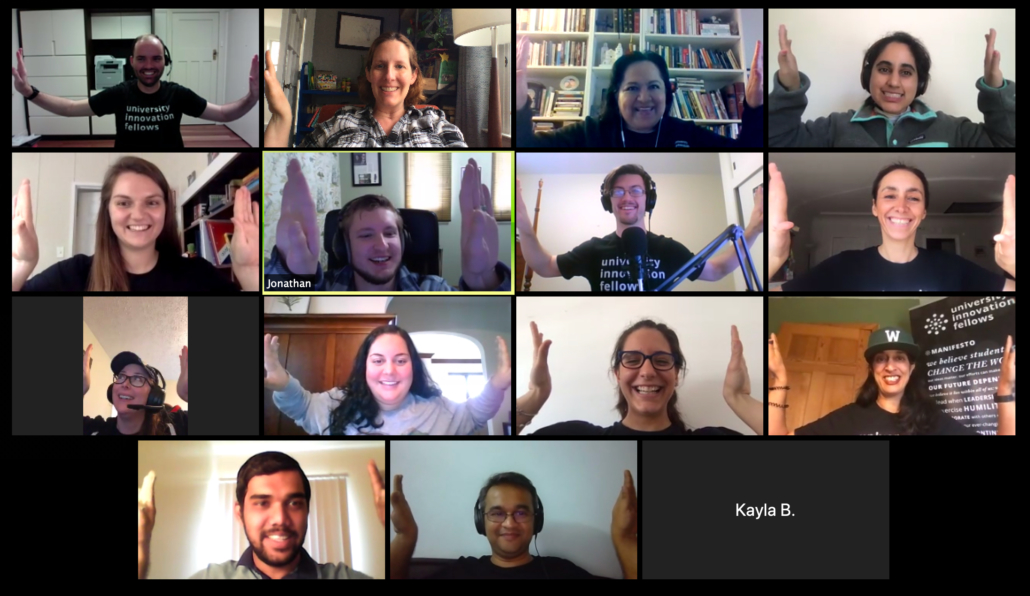
New experiments in a familiar space
This online meetup format was new to us, but experimenting with creative ways to engage students online is not. Since 2013, Fellows joining our program have learned in virtual learning spaces — in both synchronous and asynchronous modes at Stanford, and at locations distributed throughout the network of institutions the Fellows represent.
We hold our training sessions online in order for our students to engage with stakeholders on-the-ground at their schools. Being immersed in their higher education ecosystems is essential for these students to learn in-context and be better equipped to create change.
We’ve used several video conference platforms in our years holding this online training, starting originally with WebEx, then to BlueJeans, and since 2018 using Zoom. NovoEd was the learning management system we use for our weekly classes, though we are currently transitioning to a custom platform built on wikimedia. But our training is so much more than the tools we use.
Our sessions combine online learning engagement with in-person engagement. Session topics range from design thinking to lean startup to storytelling, and combine text with short videos, articles and discussion threads. Assignments ask students to interview other students, faculty and administrators at their schools; map their campus ecosystem; brainstorm with their teams; test prototypes with stakeholders; and synthesize and report their findings.
During the students’ training and beyond, they are mentored not only by our team and their faculty members, but by aFellow who is assigned as their mentor (we call them uiguides). This Fellow, often from their time zone or at a school similar to theirs, checks in with the students weekly by video conference, reviewing their findings, offering feedback, helping manage team issues, and suggesting ways to overcome obstacles. In this way, we are able to create a distributed network of supporters who interface directly with the team and communicate the teams’ progress with staff.
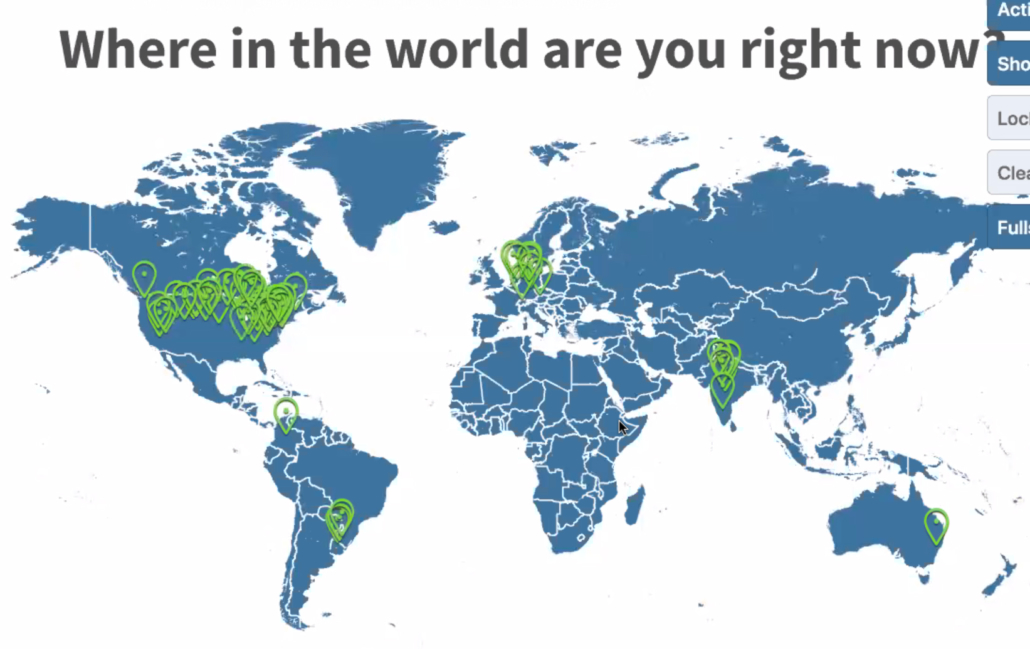
Future digital experiments
After this event, we held a virtual accelerator called UIF vs Corona in April, which you can read more about here. We’re currently redesigning our online training, held each Fall for new UIF candidates, to address the challenges of another semester that many of our students will spend learning virtually.
Although there are many challenges today, we as educators should be treating this strange, online-only learning environment as an opportunity for our students to learn while making a difference. We can model resilience by showing our own willingness to be innovators in how we teach. Now, more than ever, they need the skill sets and mindsets to contribute real solutions to uncertain futures, like the current pandemic.
Challenge accepted!





